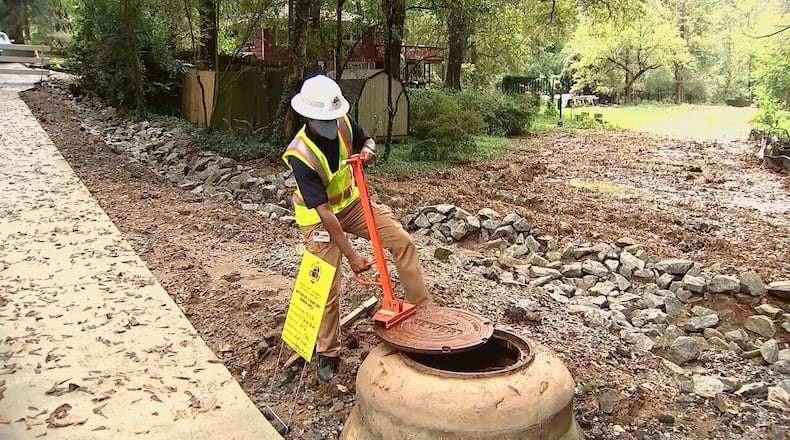DeKalb County administrators recently proposed a 10-year extension to an agreement with state and federal regulators that currently requires the county to plug the leaky sewer system and bring it into compliance with the Clean Water Act by 2027.
Yet another extension could result in the county being fined up to $100 million and unspecified “additional sanctions,” according to a memo from county staff to the Board of Commissioners recapping a Jan. 30 federal court hearing.
DeKalb County CEO Lorraine Cochran-Johnson, who took office Jan. 1, did not respond Friday to emailed questions.
The U.S. Department of Justice, the Environmental Protection Agency and the Georgia Environmental Protection Division “expressed dissatisfaction with the projected delay” in court, according to the memo, which added that regulators “expressed concerns about the potential for further delays and the lack of a firm commitment from the county.”
Regulators requested the hearing after former CEO Michael Thurmond sent the state and federal environmental agencies a letter on his last day in office stating that the county would blow the 2027 deadline, which his administration negotiated after missing the original 2020 deadline.
Thurmond, who took office in 2017, is generally not blamed for failing to meet the 2020 deadline, which the county agreed to in 2011. DeKalb’s failing sewers are the product of decades of neglect and mismanagement, and Thurmond was widely praised for renegotiating the agreement, known as a consent decree. But his Dec. 31 letter incensed state and federal officials, according to court documents and the Jan. 30 memo.
Judge Steven Grimberg, who has overseen the DeKalb consent decree, “emphasized the impact of delays on residents,” according to the memo. “He also questioned the value of the (consent decree) if court-ordered deadlines are not met.”
Under the agreement, DeKalb had proposed to build two underground basins in the county’s southern half to store excess wastewater during storms. But Thurmond and county commissioners argued over potential locations for the storage tanks, citing environmental justice concerns in neighborhoods. The County Commission finally voted last month to store the sewage at the Snapfinger Advanced Wastewater Treatment Facility, at a cost of $815 million.
“Judge Grimberg questioned why these issues weren’t addressed earlier, given the known challenges of infrastructure in residential areas,” the memo said.
In court, DeKalb’s attorneys highlighted the county’s progress, saying half the agreement’s priority fixes were finished by 2023. The county said costs had increased due to a more detailed understanding of the system, including the discovery that the original plan to upsize trunk sewers was not going to work.
The last time DeKalb asked for an extension, the county also said it had underestimated the time and money it needed, Georgia EPD representatives said in court. Thurmond said in 2020 the work could “absolutely” be done by 2027.
Grimberg told the county to prepare a report within six weeks about the remaining priority fix sites, including descriptions of the necessary work, environmental and economic impacts and timelines. The county must then discuss the plan with the state and federal agencies and report back to the court in approximately 12 weeks, the memo said.
DeKalb has invested $640 million in the consent decree but needs an additional $1.5 billion, county administrators said. The County Commission is weighing a plan to increase water and sewer rates by 10% over each of the next 10 years, which would more than double the average residential bill but generate more than $4 billion for the consent decree and the deteriorating drinking water system.
“We wish that we were able to present something that was not as expensive, but we have shown time and again that the fact remains, that because of not investing a relatively modest amount on an annual basis — which many jurisdictions have done — it leaves us in a position where we need to make these investments now,” Chief Operating Officer Zach Williams said last week to commissioners. “What we can do is make investments, beginning now, that will secure the future for DeKalb County.”
About the Author
Keep Reading
The Latest
Featured




